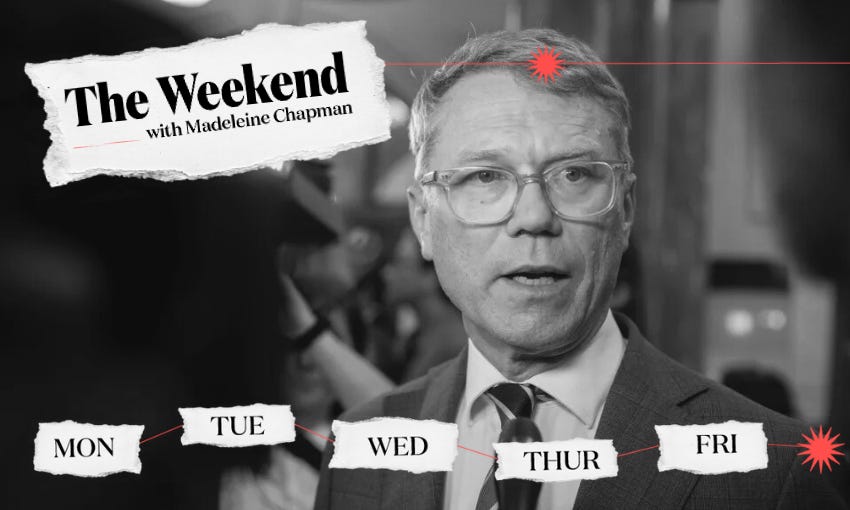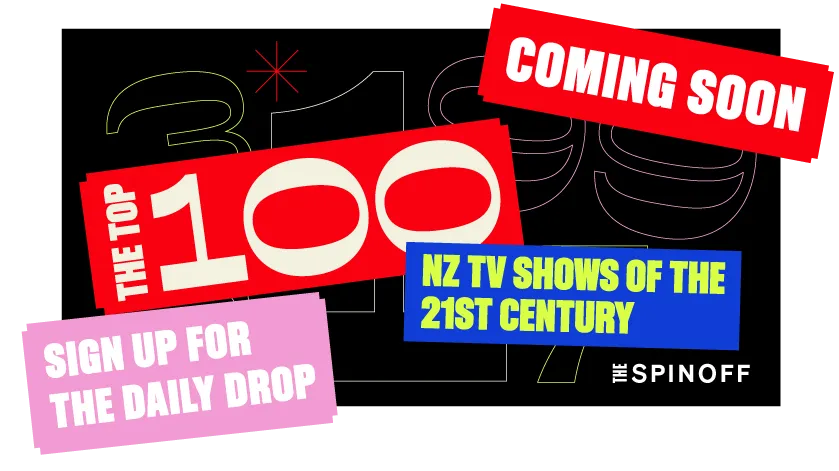The Weekend: How to get hired
It's all about knowing the right people: plus cannabis, meth and deer
Kia ora and welcome to The Weekend with Madeleine Chapman
There’s been a lot of talk about getting hired on The Spinoff this week. A few months ago for this newsletter I wrote about two new appointments to the Human Rights Commission: Stephen Rainbow as chief human rights commissioner and Melissa Derby as race relations commissioner. I was surprised by their appointments as their history of comments and views regarding human rights issues felt at odds with the commission’s work.
This week, I wrote about the documents (requested through the Official Information Act) that showed neither Rainbow nor Derby was shortlisted for their respective roles by the independent assessment panel. In fact, Rainbow had been added to the shortlist by justice minister Paul Goldsmith then, when he was “not recommended” following his interview, Rainbow was hired anyway. Derby wasn’t part of the original interview process but was invited to apply late by Goldsmith, interviewed late and was subsequently hired.
In short, Goldsmith either knew of and liked Derby and Rainbow and worked hard to make sure they were hired. Or someone he consulted in government really liked them and advocated hard for their appointments. Either way, Rainbow and Derby had friends in the right rooms and next month will begin their lucrative new jobs.
While this was happening, podcast host Hana Schmidt was going viral for ranting about New Zealand-born Samoans (particularly afakasi) using their ability to code switch to get jobs in corporate spaces, boardrooms and government agencies. Her implication was that Samoans who could pass for being white (or ambiguous) had an advantage in work spaces and exploited that advantage without actually “representing” their communities.
Schmidt has been roundly criticised and mocked for her take on this, but she’s not wrong that the whiter you and your name appear to be, the smoother the path in business settings. But what she has failed to realise is that any perceived advantage Samoans with pale skin might have pales (lol) in comparison to the biggest advantage of all: knowing the right people.
There are industries where personal connections are nearly a requirement (look at Hollywood) and others where family connections are the whole point (family restaurants, tradies with sons for apprentices). The former is more public and scrutinised but nepotism exists everywhere, it’s just a fact of life.
So here’s how to get opportunities in New Zealand.
Disclaimer: this is not to say that People Who Know People aren’t skilled or talented, but connections are a huge help.
Have parents (or close relatives) who can hire you
The surest path to success, bar none, is through your parents. Because opportunities in work are all about who you know, so if your parents are People To Know who give out opportunities, you’re 90% of the way there. You’re also far more likely to be interested in the sectors where your parents work. Sometimes it feels like every second journalist I’ve ever met has a journalist or writer for a parent.
Have parents (or close relatives) who can put in the good word to their friends
Sometimes you might want to do something completely different to what your parents did, or you would rather not be hired by your parents, which requires distancing yourself. So that’s where your parents’ friends and colleagues come in, to hopefully hire you instead. A gentle word here and there and you’re away laughing.
Have a friend from school who has succeeded (see above) and can hire you
If you don’t have parents who can hire you, the next best thing is to have friends who do. This is why so many middle class parents fork out for private school.
Literally just know anyone in a position to offer opportunities
I cannot stress enough how much of a difference this makes. Even for seemingly mundane work, it’s so much easier for people to hire their or their friend’s kid than to recruit, interview and hire a stranger. And once you’re in, you’re in. People like Rainbow or Derby may not have had parents or connections all those years ago but relationships help with careers no matter what stage you're at.
Be talented, qualified, hardworking and ambitious
If you are these things and you know people? Buckle up, you’re going places. If you’re just these three things? Good luck and I wish you the best, it’s a tough market out there.
That might read like a glib list, and I know there’s a reflexive defensiveness whenever people feel like their hard work has been devalued, but it’s not an indictment, it’s simply the reality. If you know people in high places, you will have access to more opportunities. Where race and gender and health and age come in is whether or not you’re likely to try to take advantage of those connections.
But this is all what happens before you get into the job, which is arguably the hardest part. Equally important is what you do once you're there. I did not have parents who could hire me and got into the media industry through a stroke of luck (a good email and writing sample sent to the right editor at the right time). But now that I’m here, other people look to me for opportunities, as a person they know.
The challenge, and not a small one, is to be willing to offer those opportunities to people who don’t know anyone at all. I have always been grateful to Duncan Greive for being willing to do that with me.
Then when I have kids and one of them decides, for some reason, that they want to be a writer, I know deep down that I'll do what every parent would do: put in a good word to the right people.
This week on Behind the Story
Senior writer Anna Rawhiti-Connell stepped into the hosting chair to talk to me this week about my exclusive reporting on the hiring process for three human rights commissioner roles. The process was overseen by justice minister Paul Goldsmith, with an independent assessment panel conducting interviews and making recommendations to him. After raising an eyebrow at two of the appointed commissioners (Stephen Rainbow and Melissa Derby), Madeleine requested information through an OIA. This week, that OIA returned with some interesting redactions, showing neither Rainbow nor Derby were on the hiring panel’s shortlists of recommended candidates. Anna and I sat down for Behind the Story to discuss the art of painting a picture around redacted information, what these roles might mean and if there’s more to uncover in this story.
Listen here, on Spotify or wherever you get your podcasts.
Rachel & Felix | EP02: Home Education
Our second episode features Felix, who is neurodiverse and found it difficult to find a school that fit him. Now, he’s making friends at Forest School where he goes weekly and building up his confidence at improv theatre classes. He’s taught at home by his mum Rachel, who never thought she would be home educating, ever. Struggling at times to keep Felix motivated in his learning at home, Rachel taps into his passion for world history (and their recent discovery of a former top-secret bunker in Mt Eden) as the means to inspire deeper engagement.
Made with the support of NZ On Air.
Watch the second episode of Home Education here, or on Youtube.
Read Gabi Lardies’s Cover Story on where and how home-educated students learn
Join our community of supporters
"I like that it feels like chipping in for a good cause, rather than paying for a subscription." - Kimberley, Spinoff member.
Whether you read, listen to or watch our mahi, you can support us to do more by donating today or signing up to become a member. Already a member? Ka nui te mihi, your support means the world to us.
Canna-conflict: Should drug companies be able to own doctors’ clinics?
Drug companies directly owning doctors’ clinics that prescribe their own products seems hard to believe, writes George Driver. However, it turns out there’s nothing in law to prevent this happening and it’s a loophole that the country’s nascent medicinal cannabis industry has been exploiting.
Medicinal cannabis was legalised in 2020, through the medicinal cannabis scheme. Under the scheme, cannabis can be prescribed as an “unapproved medicine” (meaning it’s not proven to be safe or effective) by any doctor, for any condition. This includes cannabis flower – aka buds – as well as THC and CBD oils and even gummies. But most doctors have been reluctant to prescribe it. Enter the cannabis clinics.
Spinoff Essay: Should I buy the murder house?
Realising she can afford to buy a house, but only one that contained meth use or murder, Kristin Kelly reflects on the true value of a home.
“It was a drizzly day, and I assumed that, in combination with the place’s history, this would mean a relatively quiet open home, but it was packed. Investors, families, rubberneckers. The house had been emptied of furniture, yet stuck to the walls of each room were staged photos. In the kitchen was a picture of a round table with four matching white chairs atop a jute rug, while in the study you could find an MDF desk, shrunk down to two centimetres and hanging beside the light switch.
While the people around me busily checked for things like watertightness and solid foundations, I mentally filled in each room with my own personal effects and affections.”
Next Monday: Our most ambitious pop culture project ever launches
For over a decade, The Spinoff has been passionate about local television. Next week we launch our most ambitious project yet: a definitive list and ranking of the Top 100 New Zealand television shows of the 21st century.
A panel of seasoned critics and our in-house couch potatoes have made their calls. The countdown to number one starts Monday, October 21.
Subscribe to Rec Room now to get the rankings delivered directly to you as soon as they're live each day.
Hardship, healing and hope: A glimpse inside the 501s conference
Many of us have become familiar with the term “501” over the last decade, with the first group of returnees arriving on our shores in 2015. The term refers to people who have been deported from Australia under s501 of Australia’s Migration Act 1958, which was amended in 2011 to include failing a “character test” as grounds for deportation. The policy has been controversial since its inception, and the returnees not entirely welcome.
Despite the negative narrative, not all who have returned to New Zealand are senior gang members or career criminals. Some 501 returnees have taken it as an opportunity to turn their lives around, and a growing number are supporting each other to overcome deportation and advocate for change. Last Friday, Liam Rātana went along to their annual conference.
The stories Spinoff readers spent the most time with this week
As discussed with Anna on this week’s Behind the Story, my report on the controversial human rights commissioners not being recommended by the hiring panel
Me again with a report from the internet and a tiring debate about what makes you a real Samoan: Happy Niue language week: The Samoans are fighting again
Pete Douglas tuned in for Matt Heath’s first week in his new job on Newstalk ZB. and asks whether Heath can save the “hell” that is talkback.
Toby Manhire with a list of all the things Christopher Luxon gets
Toby Manhire again with the losers, losers and other losers in the one-year-on polling
Recommended reads for your weekend
Mike Fagan, a deer culler for the New Zealand Forest Service in the 70s and 80s, has ranked the seven types of deer in New Zealand.
Think you’re a people-pleaser? It is likely draining and confusing for the people around you, writes Gráinne Patterson.
Gabi Lardies has found you a hot new hobby: Robot fighting.
Worried that your texts are annoying as hell? The Spinoff guide to life has some advice for you.
More help for your personal woes: Hera Lindsay Bird reminds us we are all castles of haunted meat.
The NZ Film Commission has been caught red-handed spending money, on things that cost money. Anna Rawhiti-Connell reports on the breaking news.
Joel MacManus has nothing against car drivers, but argues that Car Lanes in Wellington are creating ‘A ghost town’.
Heavenly Creatures was released 30 years ago on Monday. Alex Casey returns to the classic masterpiece about the bizarre and notorious murders.
The Office Australia seems proud of the franchises’ first lady boss. Alex Casey chatted to Felicity Ward, who says, “if anything, she’s bad for feminism.”
Shanti Mathias hates CAPTCHAs, and presents a case on why you should too.
Two little NZ businesses, Barilla and Sportify, have recently won big trademark battles against huge overseas corporations, reports Lyric Waiwiri-Smith.
Reader feedback of the week
“For a little while in the 90s I flatted with a German woman studying in Christchurch. After she went back home Heavenly Creatures came out there and she was excited to take her friends to see it, to show them where she'd been living the last few years. She got a lot more than she'd bargained for.. she was gobsmacked to find that her first flat in Gloucester St was in fact Pauline Parker's house.”
— Petone
“If I ever found a whitetail spider in our house I used to catch them in a cup and gently move them outside. Ever since learning that they're actually from australia however, I've started squashing them mercilessly while muttering 'you can go back to where you came from' chillingly under my breath. Am I a racist now?”
— Mangoraki_Mansions
Thanks for reading.
— Madeleine Chapman














